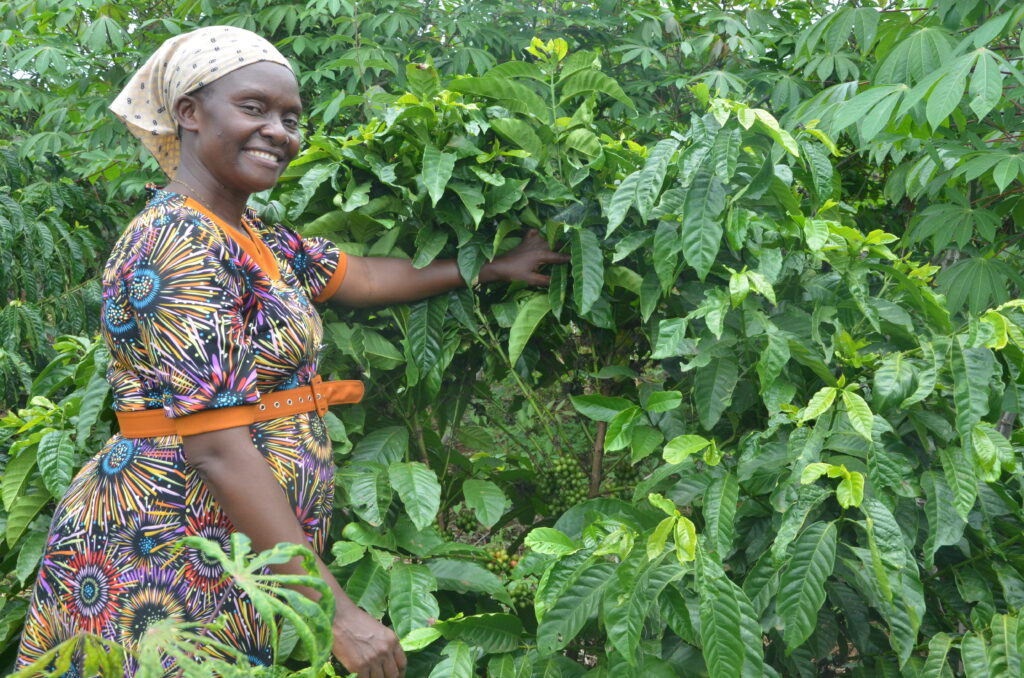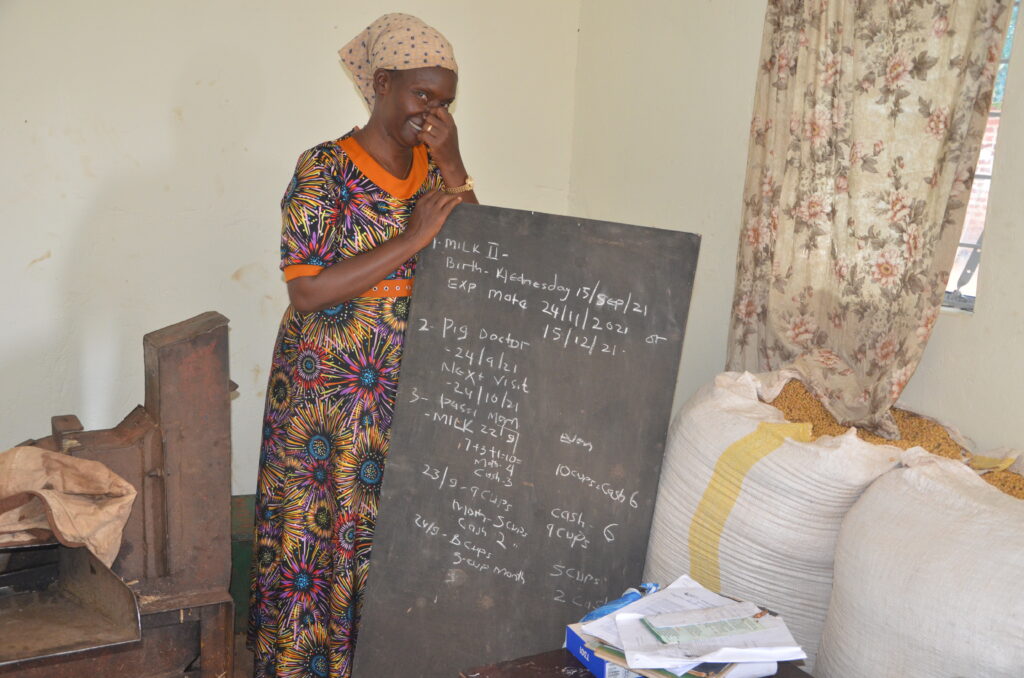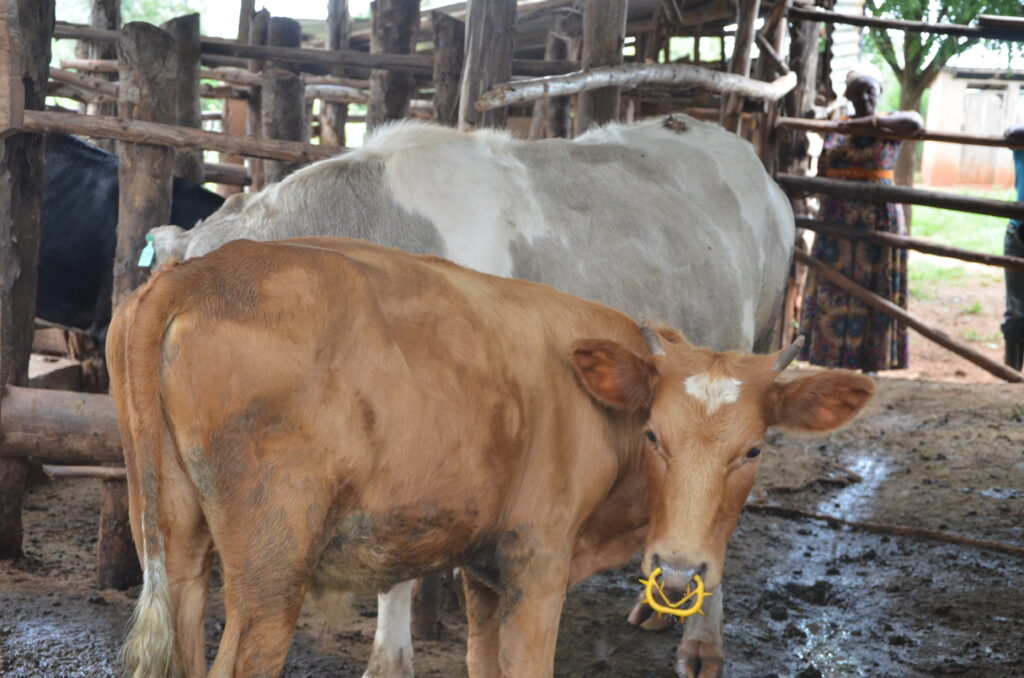By Wilson Asiimwe
Life gives humanity so many opportunities. Some people grab them and change their lives. Others just let these chances pass away!
But for Grace Bagada Mukugize, an opportunity to train in wine processing in 2018 turned into the golden opportunity.
After attending a training at her church, St. Peters Cathedral Bunyoro-Kitara diocese in Hoima City, about hibiscus, Bagada went straight into implementing what she had learnt.
Today, she squeezes money out of hibiscus, which in the past was considered a useless wild shrub with no value.
Bagada, a resident of Hoima City, is making juice and packed hibiscus tea leaves at her home. She has also trained many other farmers who supply her with the flowers in Hoima district.
Genesis
Grace, who is married to Rogers Mukugize, has been involved in the church leadership in the Bunyoro-Kitara diocese and is the president of the Mother’s Union there. On the other hand, the couple has also been actively engaged in farming as a family business.
In 2018, Bagada attended one of the trainings at the diocese about hibiscus, which birthed a desire to invest in that business. “After the training I asked the trainers for seeds, which I planted in my compound. They did well to my delight,” she says.
Seeing the success of the crop, Bagada engaged the other women who had attended the church training to grow the crop. Bagada also attained additional training from the Uganda Industrial Research Institute (UIRI) on how to process juice and wine from the plant, in 2019 and the training took two months
She says processing hibiscus juice is a lucrative business, especially for the people who don’t have a lot of land. Growing, processing the crop and adding value to it does not require a lot of land, she explains.

Hibiscus business
“When I plant after three months I harvest and dry the flowers. Sometimes I get stock that can take me for around five months,” she says.
“It is a family business based in Hoima as the proprietor although we engage a number of youths in processing the juice. We plant depending on orders. We started with a demonstration site where we planted the plant for processing hibiscus wine and juice. We are operating the initiative under a company registered to process hibiscus that comprises many medicinal components,” she explains.
Additionally, the team also buys flowers from out growers in order to meet the growing demand for the juice in and around Hoima.
Varieties
The plant is grown from seedlings which are propagated vegetatively. Most farmers engaged in growing it carry out multiplication of the seedlings.
There are three major varieties, tropical hibiscus, hardy perennial hibiscus and hardy shrub hibiscus producing different colours of flowers ranging from pink, red, orange, white and purple, among others. Processors can use any of the flowers for processing juice, wine and tea leaves. It can be grown all year round according to Bagada.
How to process hibiscus juice
Bagada says it takes three months for the plant to mature and produce flowers which are harvested and dried for a week. They are then soaked in boiled and cooled water for one day after which the other ingredients such as sugar, citric acid and sweetener are added.
“A one-litre concentrate of all ingredients mixed will produce around 50 litres of the juice and on average we produce 200 litres per week,” she adds.
She says 40 kilogrammes of hibiscus flower processed will enable you to obtain 120 cartons of juice.
The equation is that one litre of concentrate is mixed with five litres of water to come up with quality juice.
Training other farmers
Bagada says she has been engaged in training other farmers to grow the crop to improve their incomes. She says she has trained over 30 farmers who are currently supplying her.
She says that because of other enterprises on the farm she has decided to source for the flowers from other farmers as one way of empowering them.
“I have trained more farmers and my target is to have many farmers trained so that we can get more flowers and do collective marketing,” she says.
She says that she has also mobilized the farmers to start a saving and credit scheme so that that they can borrow money within their scheme
Prices and marketing
The juice is packaged in 300ml each bottle costing sh15,000 and a carton is sold at sh10,000 wholesale price.
She says that she has different packaging materials ranging from 3-5 litres and her market is mainly shops around Hoima and the nearby districts.
In addition, some of the customers come directly to the couple’s home to get the products.
Tea leaves
Apart from making hibiscus juice, the group processes hibiscus tea, packaged in 50gms costing sh3,000 and 100gms costing sh7,000. These products are distributed in supermarkets within Hoima.

About hibiscus
Bagada says that hibiscus juice, tea and wine are also available in supermarket shelves becoming an instant hit with especially the growing middle class.
She says that hibiscus is particularly a favourite among health-conscious consumers due to its many health benefits and the business is riding on the fact that farmers in Uganda have started commercially growing hibiscus.
Climate smart agriculture and best innovations at the farm
Bagada and her husband Rogers Mukugize have set up a biogas plant at the farm which uses the dung from the cows.
She says that the biogas project was started in 2022 and it is helping them to reduce on the costs of energy at the farm, called Grace Farm.
She says that she that they spent over two million shillings on setting up the bio gas which they are using at the farm house.
She said that they have also drilled water from underground to ensure that the farm has constant water supply throughout the year.
She says that they spent over 12M on drilling the water from underground because they had a problem of draught which used to affect the farm.
Mukugize says they have also trained their workers on how to make silage for the cows at the farm and they also mulch their coffee in order to retain the soil nutrients.
The couple has also planted trees like grevillea along the boundaries of their land to conserve the environment.
They have also set up rain water harvesting tanks in order not to lose any drop of water at the farm since water is essential.
Mukugize said that in 2021 they bought two water tanks of 10,000 litre capacity which they installed at the farm.
Record keeping and farming as a business
The couple also keeps records for every activity on the farm in order to determine the losses and profits on the farm.
“I have ensured that all the farm records are up to date and some of my workers I have trained them give me records because that is our business we need to know the income earned and spent,” Bagada says.
Family involvement and workers on the farm
She says all her children during the holidays dedicate time and work on the farm and her husband has been supportive.
“My husband has been very supportive even when he is engaged in other activities but he finds time for the farm and where we need experts on the farm he brings them and all my children work on this farm,” She says.
Labour force
She employs four workers who reside at the farm while other casual workers are employed depending on the need at the farm.
“I have a farm manager and other three support staff but when there is a need for more workforce we employ casual workers and pay them 15,000-20,000 shillings per day depending on the work,” She says.
Mistakes and lessons learnt
She says that because of her tight schedule she would take time without visiting her farm and that would give advantage to some of her workers to connive with thieves and steal from the farm.
“I had started rearing some goats on my farm but the workers could connive with thieves and steal them but now I have my time table when to do my other duties and visit my farm and that is no longer a challenge on the farm.
Other enterprises on the farm
Bagada and her husband Mukugize have also set up a coffee and dairy demonstration farm at their village home in Karubale word, Buraru sub-county.
She says that the four and half acres of coffee which was planted around July 2021 has started fruiting and they expect to start harvesting soon.
Cows
Friesian cows
Bagada says that the couple has over eight cows on the farm which are under zero grazing and they have a veterinary doctor who visits the farm to check on them and give them medication every month.
“The milk capacity is still very low but we have planted our own three acres of Napier grass which we are using to make silage and feed on the cows,” she says.
She gets on average 20 litres of milk per day and each litre of milk is sold at 1200 shillings in Hoima town

Soya beans and maize
The couple also planted three acres soya beans and three acres of maize which they have since harvested for commercial and food security.
Plans
She says the couple currently want to expand the farm in Buraru and venture into coffee value addition so that they can make a lot of money from coffee.
“We have already done the feasibility studies we want to get our own coffee processing machine and venture into value addition when production is at its peak because we have started planting and we are still planting more,” She says.
She says that since they have a water source at the farm they also intend to expand the farm house so that they host visitors.
“We have many people who are looking at us both in the church where I am serving and in the community. They all want to come and learn some of the best farming practices. We need a place where to accommodate them,” She said.
What other residents say
Fred Musinguzi a resident of Bujumbura in Hoima city
We have learnt a lot from that family. They are always sharing with us information about agriculture and as a result they have inspired many into farming. God has blessed that family and shall continue consulting them because they work as a family.
Edward Kyaligonza a resident of Bulima along Hoima-Masindi road
Bagada and her husband have opened opportunities for many people in Hoima through their farm. We are able to learn and engage in modern and productive farming. They have also given opportunities to families to start growing hibiscus and supplying them. They are not a selfish family because they always want to share whatever they have with other people.
Edreld Kakyo a resident of Hoima town
Personally, I have never met them but I visited their farm in Buraru and I was very happy with the hard work they have inspired me and I want to visit the family one of these days so that they can train me so that I can also start venturing into agriculture.
Juliet Kansiime a resident of Muhooro in Kagadi district
Grace is the president of the mother’s union in our diocese and she has always preached development and am happy that she is practicing what she has been preaching. Even those people who don’t subscribe to the church of Uganda can learn from her.





